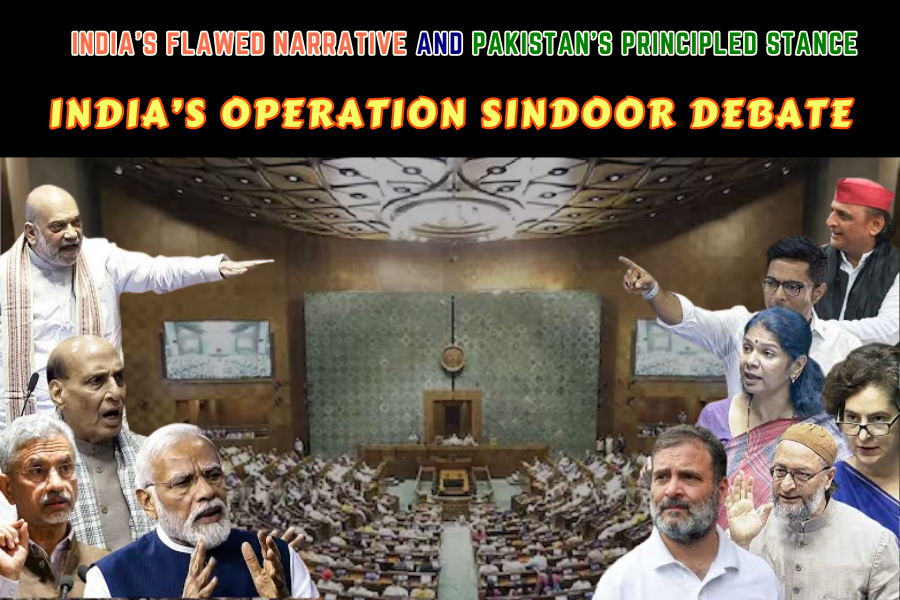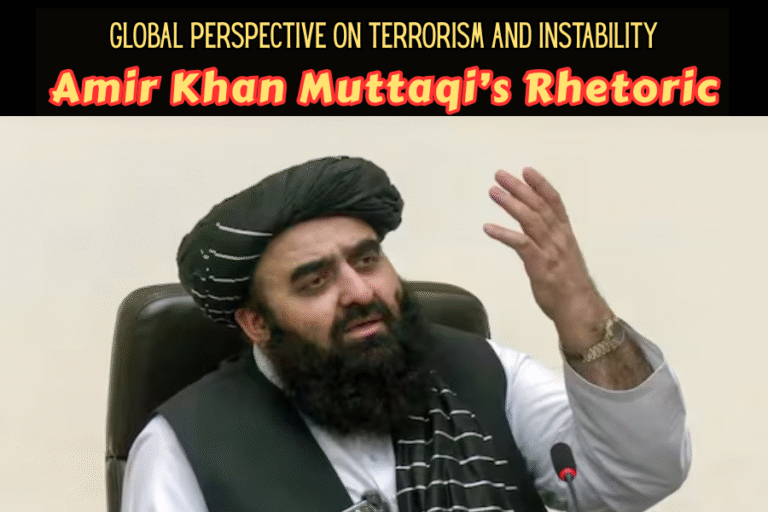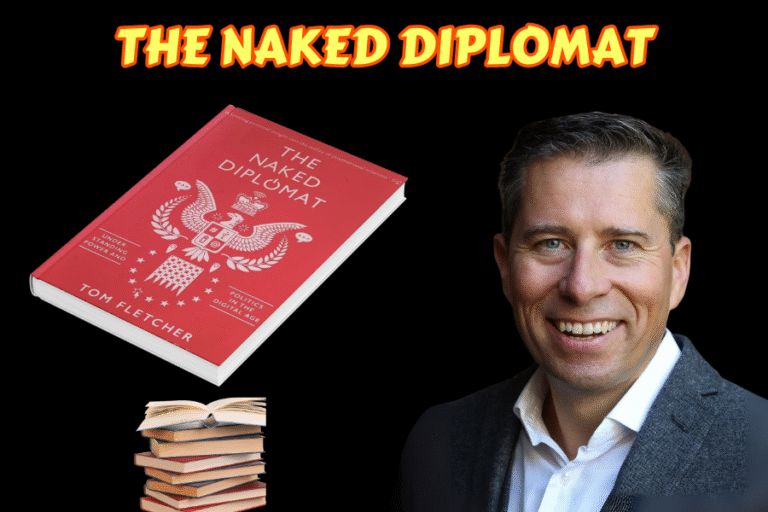(Ayesha Mahnoor)
Introduction
In July 2025, the Indian Parliament’s Monsoon Session erupted into a fiery debate over Operation Sindoor, India’s aggressive military strikes on May 7, 2025, targeting alleged terror sites in Pakistan following the April 22 Pahalgam attack. For instance, the ruling Bharatiya Janata Party (BJP), led by Prime Minister Narendra Modi, hailed the operation as a decisive blow against Pakistan’s supposed terrorism sponsorship. However, this narrative, steeped in arrogance, crumbled under scrutiny from opposition leaders and Pakistan’s dignified rebuttals. Consequently, the debate exposed India’s attempt to mask security lapses and diplomatic failures with jingoistic rhetoric. Moreover, Pakistan’s Foreign Office condemned India’s distortions, affirming its resilience against unprovoked aggression. This essay dissects the parliamentary debate, reveals the weaknesses in India’s official stance, amplifies opposition critiques, and underscores Pakistan’s principled position, while drawing lessons for third world nations like Pakistan navigating India’s belligerence.
Historical Context
India-Pakistan relations have been fraught since 1947, marked by wars (1947, 1965, 1971, 1999) and ongoing Kashmir disputes. For example, the 2008 Mumbai attacks halted bilateral cricket, reflecting India’s pattern of politicizing even cultural ties. The April 22, 2025, Pahalgam attack, which killed 26 civilians, escalated tensions, prompting India’s Operation Sindoor, a retaliatory strike targeting nine alleged terror sites in Azad Kashmir and Pakistani Punjab. Specifically, India’s suspension of the Indus Waters Treaty in May 2025 further strained relations, threatening Pakistan’s economic stability. Consequently, the operation, launched amid public outrage, was framed by India as a precise counterterrorism effort. However, Pakistan’s swift retaliation, damaging Indian airbases, challenged India’s narrative of military supremacy. Thus, the debate in India’s Parliament, held July 28-29, 2025, became a battleground for competing narratives, with Pakistan’s resilience overshadowing India’s aggression.
Details of the Parliamentary Debate
The Indian Parliament allocated 16 hours in each house—Lok Sabha and Rajya Sabha—for the Operation Sindoor debate, starting July 28, 2025. For instance, Defence Minister Rajnath Singh opened the Lok Sabha discussion, claiming the operation “inflicted heavy damage” on Pakistan’s terror infrastructure, destroying nine sites, including seven in PoK, in 22 minutes. He boasted of India’s restraint, avoiding civilian targets, and claimed Pakistan “conceded defeat” by requesting a ceasefire on May 10. Similarly, Prime Minister Modi lauded the operation as a “new normal” in counterterrorism, asserting no world leader opposed it. External Affairs Minister S. Jaishankar denied U.S. mediation, refuting Trump’s claims of brokering a ceasefire through trade threats.
However, opposition leaders challenged this narrative. For example, Congress MP Rahul Gandhi accused the government of lacking “political will” and constraining the military by sparing Pakistan’s air defenses. Priyanka Gandhi Vadra highlighted the absence of resignations post-Pahalgam, unlike the 2008 Mumbai attacks, questioning accountability. Moreover, Samajwadi Party MP Ramashankar Rajbhar criticized the 17-day delay in launching Sindoor, demanding a “tandoor” (decisive) response instead. Congress MP P. Chidambaram questioned the assumption that Pahalgam attackers came from Pakistan, demanding proof. Consequently, the debate, marked by theatrics—BJP MPs chanting “Hindu!” and opposition chanting “Indian!”—revealed deep divisions, with Pakistan’s perspective largely ignored.
Weaknesses in India’s Official Narrative
India’s government narrative on Operation Sindoor is riddled with flaws, exposing its arrogance and diplomatic shortcomings. First, the claim of a “precise, non-escalatory” operation is dubious. For instance, Pakistan’s retaliation, targeting Indian airbases from Srinagar to Bhuj, suggests India underestimated Pakistan’s military resolve. India’s assertion that Pakistan “conceded defeat” is baseless, as Pakistan’s Foreign Office reported significant damage to Indian assets, contradicting Singh’s claims of minimal losses. Moreover, the operation’s 17-day delay undermines India’s narrative of urgency, as Rajbhar noted, suggesting either intelligence failures or political posturing.
Second, India’s rejection of U.S. mediation is inconsistent with Trump’s repeated claims of halting Sindoor 26 times via trade threats. For example, Jaishankar’s denial of Modi-Trump talks between April 22 and June 17 lacks credibility, given Trump’s lunch invitation to Pakistan’s Army Chief Asim Munir. This suggests India bowed to external pressure, undermining its “strategic autonomy” narrative. Furthermore, India’s failure to secure global condemnation of Pakistan, as Rahul Gandhi criticized, highlights diplomatic weakness, despite delegations to 30 capitals.
Third, the government’s focus on “civilisation versus barbarism” reeks of chauvinism. For instance, Singh’s rhetoric alienates Pakistan and fuels domestic polarization, as Priyanka Gandhi’s naming of victims sparked divisive chants. Additionally, the operation’s reliance on indigenous weapons, while touted as a success, ignored losses—potentially four to five jets, per Trump’s vague remarks—exposing vulnerabilities. Thus, India’s narrative crumbles under scrutiny, revealing a desperate attempt to mask failures with nationalist bravado.
Opposition Leaders’ Critiques
Opposition leaders exposed critical flaws in the government’s handling of Operation Sindoor and the Pahalgam attack. For instance, Rahul Gandhi accused the Modi administration of lacking “political will” and imposing constraints that led to aircraft losses by not targeting Pakistan’s military infrastructure. He argued this limited the operation’s effectiveness, allowing Pakistan to retaliate robustly. Similarly, Priyanka Gandhi Vadra demanded accountability, noting no resignations followed Pahalgam, unlike the 2008 Mumbai attacks, where senior officials stepped down. She questioned why no heads rolled despite admitted security lapses by Jammu and Kashmir’s Lieutenant Governor Manoj Sinha.
Moreover, P. Chidambaram challenged the government’s assumption that Pahalgam attackers originated from Pakistan, demanding evidence and exposing India’s rush to blame its neighbor. Samajwadi Party MP Ramashankar Rajbhar criticized the 17-day delay, arguing it diluted public demand for swift retaliation. For example, his “tandoor, not Sindoor” remark resonated with public frustration, highlighting India’s sluggish response. Additionally, Congress MP Pramod Tiwari raised four unanswered questions: the terrorists’ identities, their origins, Trump’s role, and whether Pakistan was forewarned. Consequently, these critiques, grounded in demands for transparency, dismantled India’s narrative of a flawless operation, aligning with Pakistan’s call for accountability.
Pakistani Foreign Office’s Stance
Pakistan’s Foreign Office (FO) issued a robust condemnation of India’s parliamentary debate on Operation Sindoor, rejecting it as a distortion of facts and an attempt to justify unprovoked aggression. On July 30, 2025, the FO stated, “India’s claims of targeting terror sites are baseless and designed to deflect from its own security failures in Pahalgam.” For instance, it highlighted Pakistan’s effective retaliation, which damaged Indian airbases, contradicting India’s narrative of supremacy. The FO accused India of violating international norms by launching strikes without evidence linking Pakistan to the Pahalgam attack.
Moreover, the FO dismissed India’s ceasefire narrative, asserting Pakistan never “conceded defeat” but engaged in mutual de-escalation to prevent further escalation. It criticized Trump’s claims as “exaggerated,” noting no formal U.S. mediation occurred, aligning with Jaishankar’s denial but exposing India’s diplomatic vulnerability. The FO emphasized Pakistan’s resilience, stating, “Pakistan remains committed to peace but will not tolerate India’s belligerence.” Consequently, it called for international scrutiny of India’s actions, urging the UN to address violations of sovereignty. Thus, Pakistan’s stance, rooted in dignity and restraint, contrasts sharply with India’s aggressive posturing.
Lessons for Third World Countries
For third world countries like Pakistan, India’s Operation Sindoor and its parliamentary debate offer critical lessons in countering great power arrogance. For instance, Pakistan’s swift retaliation and diplomatic response demonstrate the importance of military readiness and strategic communication. Specifically, by challenging India’s narrative through the FO, Pakistan showcased how smaller nations can assert sovereignty against aggressive neighbors. Moreover, investing in soft power, as Pakistan did during the 2025 WCL cricket boycott, can amplify global influence. For example, Pakistan’s participation despite India’s withdrawal won international goodwill.
However, resource constraints, such as Pakistan’s limited defense budget, pose challenges. Consequently, third world nations should prioritize cost-effective defense systems, like electronic warfare, which Pakistan used effectively in May 2025. Additionally, diplomatic alliances with powers like China, as seen in Pakistan’s CPEC ties, can counterbalance India’s regional dominance. Thus, Pakistan’s principled stance offers a model for nations navigating superpower rivalries, emphasizing resilience and strategic diplomacy.
Conclusion
The Indian Parliament’s debate on Operation Sindoor exposed India’s flawed narrative, rooted in arrogance and obfuscation. For instance, the government’s claims of a decisive victory crumbled under opposition scrutiny, revealing delays, losses, and diplomatic failures. Opposition leaders like Rahul and Priyanka Gandhi rightfully demanded accountability, questioning India’s security lapses and political constraints. In contrast, Pakistan’s Foreign Office delivered a dignified rebuttal, exposing India’s aggression and asserting its commitment to peace. Consequently, the debate underscores India’s failure to justify its actions, while Pakistan’s resilience shines as a beacon for third world nations. India must abandon its belligerent posturing and embrace dialogue, lest it further isolates itself globally.







